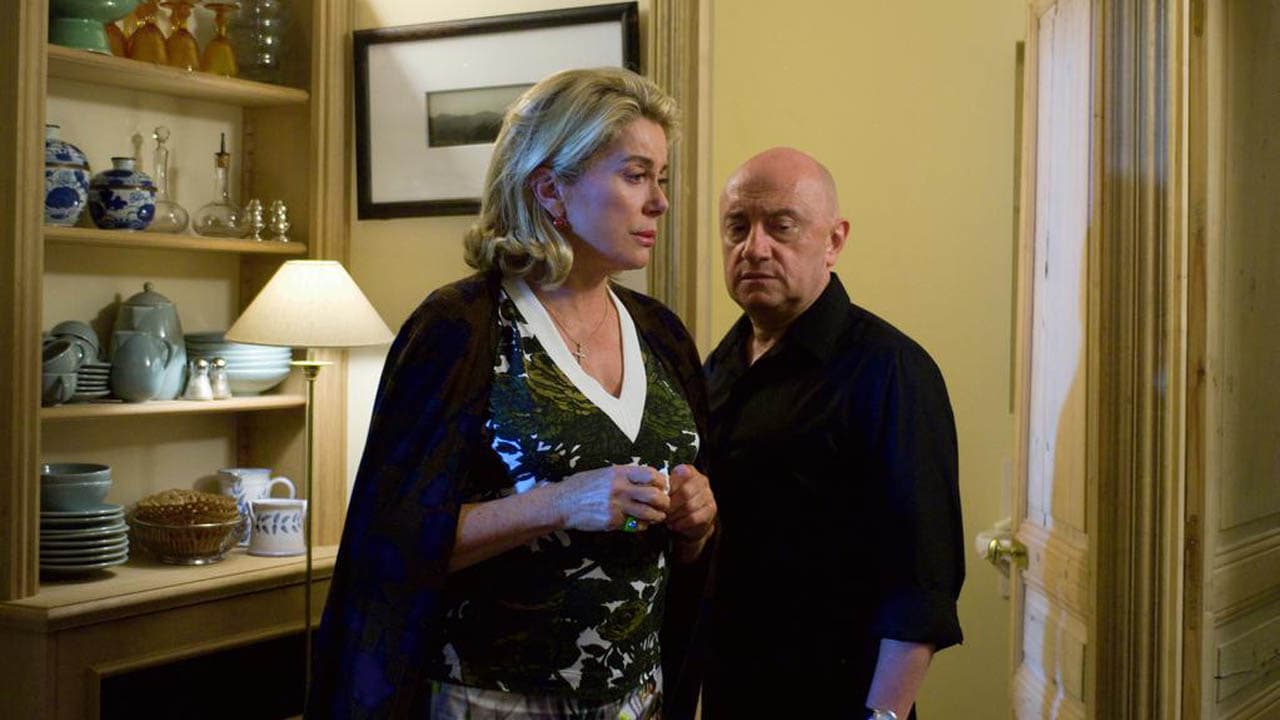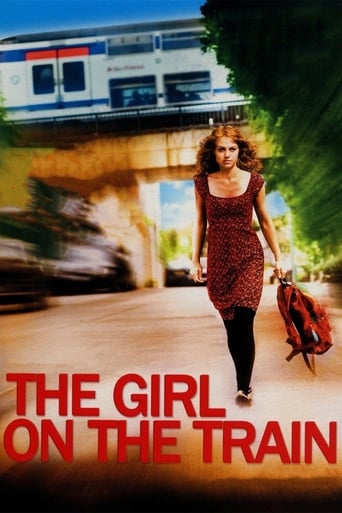

It's a mild crowd pleaser for people who are exhausted by blockbusters.
... View MoreBlending excellent reporting and strong storytelling, this is a disturbing film truly stranger than fiction
... View MoreIt's the kind of movie you'll want to see a second time with someone who hasn't seen it yet, to remember what it was like to watch it for the first time.
... View MoreStrong acting helps the film overcome an uncertain premise and create characters that hold our attention absolutely.
... View MoreThis movie is basically pointless. I was drawn in by the storyline only to find that the movie meanders on for some 80-85 minutes or so in the 'les circonstances' except that there really aren't a lot of circumstances that add up to what the protagonist does. Afterward, the protagonist cuts herself a little, draws a few swastikas on herself and says she's been a victim of a hate crime. Her mom knows its not true as her daughter, the protagonist, claims she was attacked because the lawyer Blestein's card was found in her bag (it turns out that Blestein didn't believe in business cards and didn't print any). Then Blestein and the girl's mom try to get the daughter to confess to what she had done. She does, gets a suspended sentence and is seen rollerblading again. What a pointless movie.
... View MoreAndré Téchiné's newest film The Girl on the Train is a combination topical expose and sophisticated melodrama. Using a real-life case where Alice (Emilie Dequenne), a girl from a banlieu outside Paris lied about being the victim of a bias attack, Téchiné takes the emotional pulse of hate crimes and finds symptoms of common psychological distress. In other words, it's a love story from the uniquely expansive—and inquiring—point of view that makes Téchiné France's most fascinating contemporary filmmaker.The first sight of Alice rollerskating through the streets, thick curly hair surrounding her stolid face, presents a "normal" Téchiné youth—complex, enigmatic, hypersensitive to the world. Alice's place in the universe, and her politically incorrect actions, recall the troubled boy in the 1987 Scene of the Crime where Téchiné evoked the template of Great Expectations to explore how one character's fortune linked to and revealed a larger, social view of destiny.Pondering Alice's emotional life when she falls in love with a young wrestler, Franck (Nicolas Duvauchelle), takes Techine beneath the surface stability of other characters. Alice's mother Louise (Catherine Deneuve) was a nonconformist now settled by maternity and unsettled by encountering an old acquaintance, Jewish activist Samuel Bleistein (Michel Blanc). Techine intermixes these histories and on-going fates; his quick, graceful pace, piercing insight and visual flair are perfectly symbolized in Alice's rollerskating sprees. One is constantly propelled and dazzled.Alice's heterosexual female story keeps Téchiné several leaps ahead of one's expectations—and especially the intellectualized gay-ghetto preoccupations of his sex-and-psychology protégé Jacques Nolot (Before I Forget, Porn Theatre).The contrasts between Alice and Louise, Bleistein and Franck vividly illustrate the common effort to achieve satisfaction and strength. For Téchiné, race, class and gender give access to understanding this constant struggle. His post-modern approach, through Dickens, Lean, even the Dardennes brothers (Dequennes is best known for their film Rosetta) remains unsentimental about obdurate human nature. And for those further intrigued by these mysteries of love and character and society—and their authenticity—an honorary soundtrack to the emotions Téchiné uncovers in The Girl on the Train can also be found in every track of Morrissey's Years of Refusal.
... View MoreI just watched this film in the cinema, and I got to say, at the end I was walking out of the cinema with a big smile on my face. Not because I had seen a very good movie, but rather because I found the sheer randomness of the narrative pretty funny.The movie tries to give a psychological motivation for the actions of its protagonist Jeanne, but what it actually accomplishes is very a fragmented sketch of Jeanne's life. There seems to be some causality in the narrative, but nowhere is there real motivation for the plot events. A lot of loose ends are left untied, and I kind of wondered why some things were even shown.The film style is sloppy and unimaginative. The director tries to establish a motif by repeatedly showing shots involving a metro, but the shots don't really fit well and its only purpose seems to be to remind us of what the movie is about (if you knew before going to see the movie). The editing is fragmentary and mediocre, the cinematography seems okay.I wouldn't really recommend seeing this film, though as I said before, I did enjoy myself, if not really for the reason I was supposed to.
... View MoreThis Téchiné "issue" film is based on an actual news story of a young woman who pretended to have suffered an anti-Semitic attack on an RER (Réseau Express Régional) train that connects Paris with the surrounding regions. The story was originally adapted for the theater by Jean-Marie Besset and watching Besset's play gave Téchiné the idea for this quickly-shot film.There's much to like, not least of which is a cast that includes Francophone mega-stars Michel Blanc and (Téchiné regular) Catherine Deneuve (as old friends) and lively young actors Nicolas Duvauchelle (of 'Les corps impatients') and Emilie Dequenne (star of the Dardenne brothers' Rosetta. This director is always good at juggling social levels and relationships (see Les Voleurs). But the subject matter seems forced and not super-relevant, a problem also of The Witnesses, but this time the issues arise in a way that makes them seem much less urgent than the AIDS crisis. Why does Jeanne (Dequenne) make up this story? What are its ramifications for actual Jews victimized by anti-Semites--and for the level of anti-Semitism in Europe and the world today? To what extent are individuals more victimized than ever by media invasions of privacy? These aren't questions that get sufficiently explored, either on a personal or a collective level. As a result viewers will experience a complicated set of characters they care about only intermittently, and a central event whose motivation is too vague to make it emotionally involving.Jeanne lives with her mother Louise (Deneuve) in a house with a garden in the suburbs of Paris very near the RER line. They get along really well. Louise earns a living minding children. Jeanne is looking for work, but not very energetically. Louise reads a web notice one day that gives her the fantasy that she can get Alice a job working for a famous lawyer, Samuel Bleinstein (Blanc), whom she knew when they were very young. Jeanne gets an interview. It's not very promising. But she and Louise are going to get plenty of quality time with Bleinstein after Jeanne's lie comes out.Before that, an online meeting: Jeanne connects in a chat-room with Frank (Duvachelle), a tattooed martial arts champion whose background may be dodgier than she realizes, but who is clearly more motivated than her because of his credible pro-sport ambitions. Jeanne and Frank have a roller-blade date and hit it off pretty fast. Before long Jeanne's not only sleeping over with Frank but sharing the responsibility of minding a mysterious electronics warehouse whose owner is away. It turns out the warehouse holds something other than electronics, and Frank's uncooperativeness with some gangster types causes him to wind up in the hospital with a potentially fatal stab wound. Frank, who has already been troubled by Jeanne's habit of lying, decides his involvement with her isn't good for either of them. It's in the wake of Frank's rejection that Jeanne cuts herself and paints on swastikas with a felt pen, then goes to the police with an invented story of being assaulted on the RER. by racist anti-Semites.Somewhat to Jeanne's shock, her story arouses an immediate and rapidly metastasizing media frenzy. She is soon forced to admit her lie. This gets her in trouble with the law. This in turn leads Louise to call on her old friend Samuel, whom she's newly aware of from finding the job at his office on the Internet. We get scenes of Samuel's extended family, a Jewish family, whose members are debating over the coming bar mitzvah of young Nathan. (The young actor has a strong presence; I can't find his name in the casting list. But his father Alex is played by Mathieu Demy and his mother Judith by the vivid Ronit Elkabetz.) 'La fille du RER' (film's French title) is meant to creep up on you. Perhaps to avoid being stamped "thriller" or "crime story," but also to show how violence can pop up unexpectedly in what seem everyday lives, it meanders for an hour before Frank's stabbing. Throughout, the film explores semi-chance interconnections of different people with complex family ties--and some, like Frank, who're estranged from any family--in a world where violence can strike all of a sudden, and is so ever-present it becomes a tool to be used by a young woman to get attention. In her search for identity--missing perhaps due to the absence of her father and the lack of any commitment to work--Jeanne seeks an artificial identity in pretending to be Jewish and a victim of violence. As Stephen Holden notes in his 'NYTimes' Rendez-Vous roundup, "Mr. Téchiné shows his special empathy for the ways youthful impatience can trigger impulsively self-destructive behavior." For young Nathan, identity is being presented on a silver platter in the traditional coming-of-age ritual of a bar mitzvah.Julien Hirsch is responsible for the film's bright, beautiful look. Costume designer Radija Zeggai gets the credit one assumes, for Deneuve's wonderfully frumpy-chic outfits.The film is scheduled for French release March 18, 2009. Its showing in the Rendez-Vous with French Cinema at Lincoln Center is its world premiere.
... View More